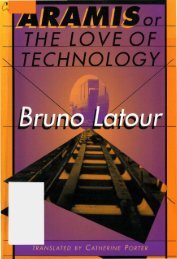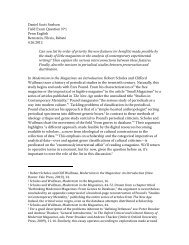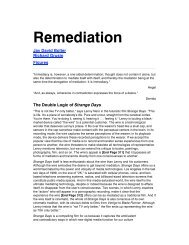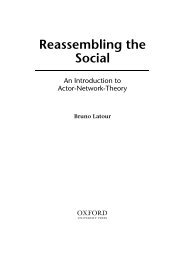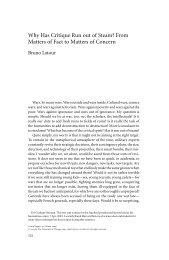The Exploit: A Theory of Networks - asounder
The Exploit: A Theory of Networks - asounder
The Exploit: A Theory of Networks - asounder
Create successful ePaper yourself
Turn your PDF publications into a flip-book with our unique Google optimized e-Paper software.
36 Nodes<br />
<strong>The</strong> problem <strong>of</strong> “control” in networks is always doubled by two perspectives:<br />
one from within the network and one from without the network. <strong>Networks</strong><br />
are, in this sense, the horizon <strong>of</strong> control.<br />
On the one hand, control is tantamount to forms <strong>of</strong> network<br />
man agement, for control in networks must meet the challenge <strong>of</strong> network<br />
regulation from a site that is internal to the network—the most<br />
“controlled” control would be one that pervades the network itself.<br />
Control in networks must aim for an effectiveness that is immanent<br />
to the network, in the sense that the most perfectly controlled network<br />
is one that controls or regulates itself. But, on the other hand,<br />
control in networks is always counterbalanced by another challenge:<br />
to be effective from outside the network (either as a set <strong>of</strong> meta -<br />
guidelines or as being logically “above” the network itself). <strong>The</strong> network<br />
itself must be articulated as an object <strong>of</strong> design, implemen -<br />
tation, and regulation. Control in this sense does not pervade the<br />
network but operates over it; control in this sense is topsight and<br />
oversight.<br />
<strong>The</strong> breakdown <strong>of</strong> disciplinary societies and the emergence <strong>of</strong> control<br />
societies raise a whole host <strong>of</strong> philosophical problems, problems that are<br />
both absolutely “ancient” and contemporary. Take, for example, the notion<br />
<strong>of</strong> “substance.”<br />
Classical philosophers from the pre - Socratics to Aristotle mused a<br />
great deal on substance. <strong>The</strong>y asked: Of what is the world made? What<br />
is the fundamental property <strong>of</strong>, for example, a living creature that<br />
allows us to conceive <strong>of</strong> and say “creature”? <strong>The</strong> question <strong>of</strong> substance<br />
is not a question <strong>of</strong> being: it is not that it exists but rather how<br />
it exists. 9 <strong>The</strong> question is not “what is it?” but rather “how does it<br />
work?”<br />
<strong>The</strong> question <strong>of</strong> substance poses particular problems when thinking<br />
about networks. Is it safe to define a network as a substance, as a<br />
particular thing? We can ask: Of what is a network made? Is it enough<br />
to say that a network is made <strong>of</strong> fiber - optic cable, routers, and terminals?<br />
This would limit our concept <strong>of</strong> “network” to computer net-



